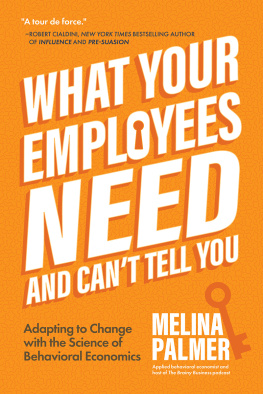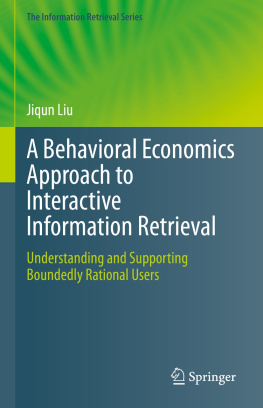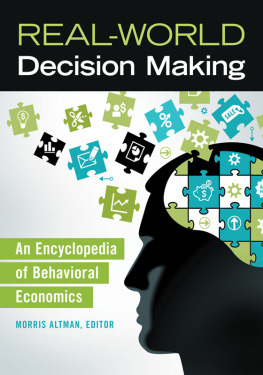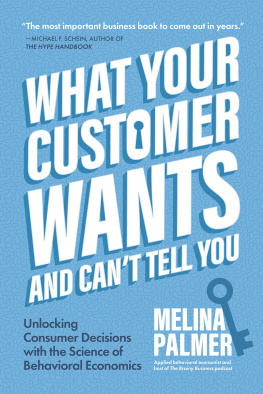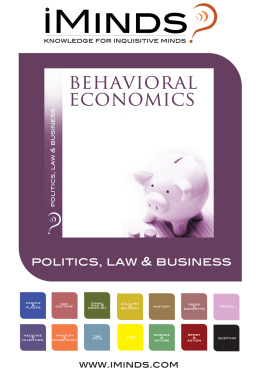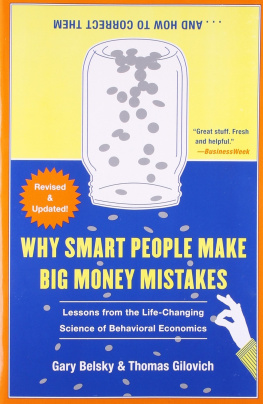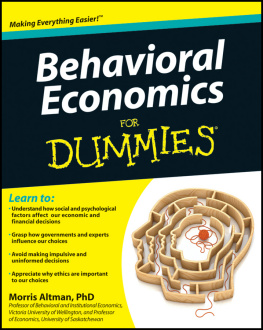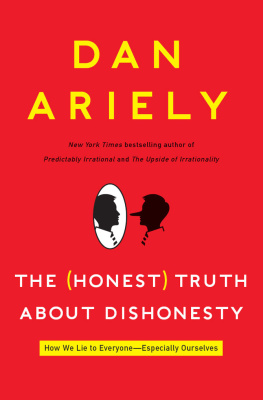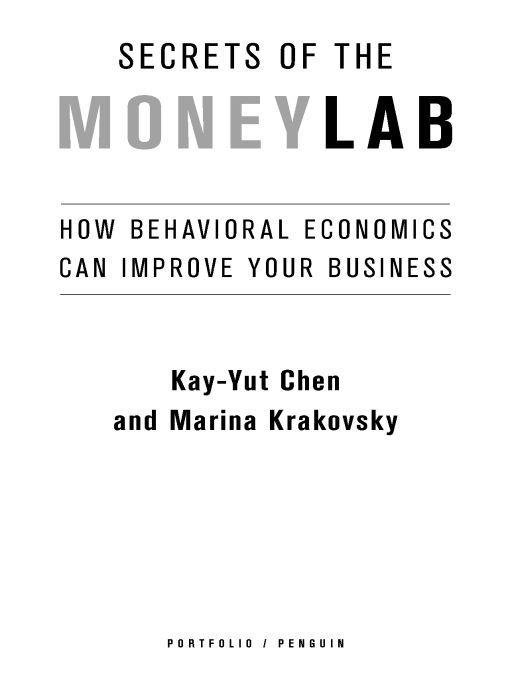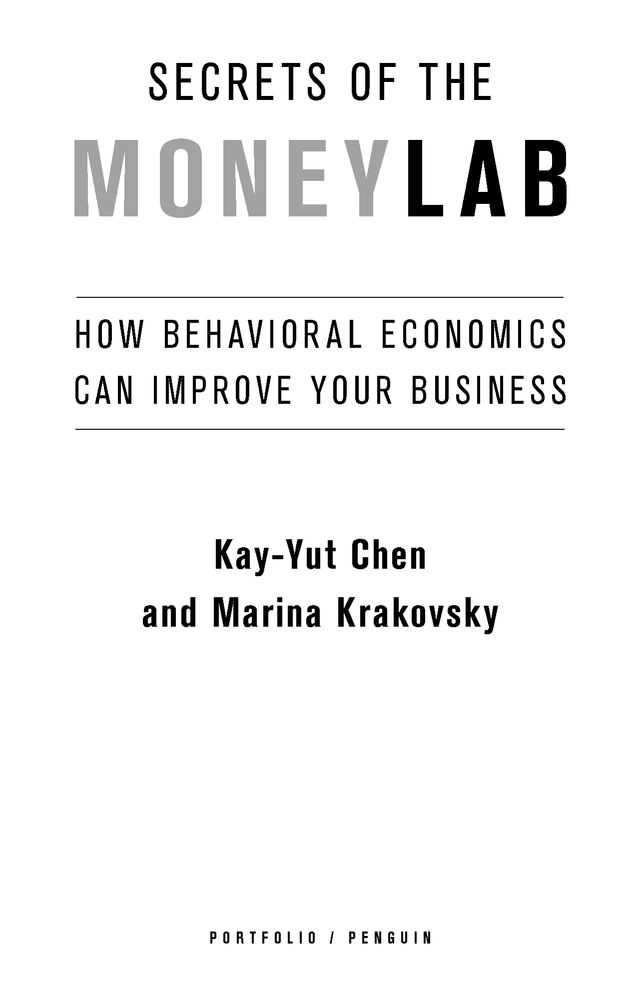Table of Contents
More Advance Praise for Secrets of the Moneylab
Secrets of the Moneylab is an entertaining introduction to the economic principles of risk, choice, trust, and consumer behavior.
Preston McAfee, vice president and research fellow at Yahoo! Research and author of Competitive Solutions
This is a well-written book that clearly articulates the value that experimental economics brings to businesses.
Bernardo Huberman, senior HP fellow and director of the Social Computing Lab at HP Labs
Chen and Krakovsky superbly introduce the underlying behaviors of human decision making. Whether youre a novice or a guru, Secrets of the Moneylab has something to offer.
Feryal Erhun, assistant professor, management science and engineering, Stanford University
This is a brilliant book. It shows you how to apply powerful behavioral economics methods to revolutionize the way you run your business. It is a must-read for any scientifically minded manager.
Teck-Hua Ho, William Halford Jr. Family Professor of Marketing, Haas School of Business, University of California, Berkeley
To our parents,
without whom nothing would be possible:
Fong-Ching Chen and Ngar-Sheung Lam Chen
and
Rina and Gennady Krakovsky
Foreword
Secrets of the Moneylab reads like a collection of short stories. It is also excellent economics. This is no coincidence. The economist and the novelist have the same basic problem. They both must describe what motivates people and how they interact, and they need to wrap it up with an interesting conclusion.
A somewhat recent development in economics, beginning in earnest some thirty or forty years ago, has been the incorporation of lab experiments. Kay-Yut is a leading experimental economist at Hewlett-Packard. Economic experimentssome his own, many from othersare a source of Kay-Yut and Marinas stories. As the authors explain, such experiments give managers a tremendously useful tool. When they have an idea, they need not try it out in the outside world; instead they can test it in the companys Moneylab. Think of the savingsif all our bad ideas could be discarded after inexpensive trial runs.
Just as important, Hewlett-Packard has given Kay-Yut access to its business culture. And we see this practical orientation everywhere in Secrets of the Moneylab. The results of the Moneylab experiments are not their only important use. The questions they pose are also very valuable.
I confess that I especially like this book because of my own personal method for doing economics. This is my personal secret (not a secret of the Moneylab). My method, especially for listening to seminars, is this: while the seminar speaker is presenting the mathematical model, I try to tell my own corresponding story. I people it with Richard, Sue, and Mary, and reach my own conclusions, not from the mathematics, but from my imagination. This method leads, surprisingly often, to conclusions that are not obvious from the mathbut are valid just the same.
But that takes us back to why Secrets of the Moneylab is such a good book. In situation after situation, it presents the basic economics in stories. And because we all think most naturally via stories, this is economics that really gets at the truth. You, the reader, will see where and when the economics of Secrets of the Moneylab apply because you can ask your own questions regarding how you think Richard, Sue, and Mary will actually interact with one another.
And you will also have a lot of fun. Secrets of the Moneylab is economics at its best: a sequence of beautiful stories.
George A. Akerlof, Nobel Prize-winning economist and author of Animal Spirits and Identity Economics
Introduction
Several years ago, Marina heard that Hewlett-Packard was looking for people to participate in economic experiments. Something intriguing was happening in her own backyard, and by the sound of it had been going on for years, yet she knew nothing about it. Marinas personal curiosity added to the universal lure of easy money, so she signed up. Before long she was at HP Labs in Palo Alto, with a dozen or so other participants in what looked like a corporate classroom: a gray, windowless room with rows of desktop computers facing a large whiteboard. Once she and the other guests were seated at their terminals, a hyperkinetic man dressed like a math professor began pacing the front of the room. He scribbled an exchange rate on the whiteboard (1,500 experimental dollars = $1 U.S.) and gave brief instructions before setting the research participants to work.
Each participant would play the role of either buyer or seller, interacting with the others through the networked computers. Buyers would order goods from the sellers and pay for them, while sellers would receive payment and choose how much to actually ship. At the end of each period, buyers and sellers would see whod fulfilled which orders. Given this information, buyers would choose whom to do business with in the next period; sellers, meanwhile, would decide how to proceed themselves. At the end of the game, the money earned during the experiment would convert to U.S. dollars: Marina and the others would earn real cash in proportion to how well theyd played.
The game lasted about two hours. Everyone played in silence, and couldnt so much as send instant messages to each other. Instead, they could communicate only through the buying and selling choices they entered into their computers. Yet they could see so much: which sellers shipped as promised and which ones cheated, how this information seemed to affect future buying decisions, and, in the last bidding period, who stayed honest when honesty no longer paid. They were seeing something of the essence of human nature at work.
When the game was over, a research assistant entered the room with a cashbox in hand and counted out each players winnings. Marina received about $75.
She wanted to know more: what did any of this have to do with HPs business? What shed known about HP Labs was what most people in Silicon Valley knewthat its research led to the development of inkjet printing, one of the companys most profitable offerings. But what was a company known for its computers, printers, and calculators doing paying people to play these games?
As a reporter, Marina carried a license to ask nosy questions. When she approached the man whod run the experiment, he handed her his card: Kay-Yut Chen, Principal Scientist, Decision Technology Dept.
Kay-Yut, it turned out, wasnt just running that days experimenthe had started the whole lab, right after finishing his PhD in economics at Caltech. Not only that. HPs lab was the first-ever experimental economics laboratory inside a corporation. That made Kay-Yut one of a kind; hed been featured in Newsweek, and Marina went on to write about his work in Scientific American and
Learning from Mistakes the Easy Way
The premise of using economic experiments in a company is simple: to make good decisions about major business processes, test them out in the safety of a lab. Without such testing, an HP marketing manager told Marina, You could waste millions of dollars implementing a program that isnt good. Indeed, thats what would have happened had the manager not asked Kay-Yut to test the idea of rewarding retailers for being among the top three in sales of HP products. On the surface, some healthy competition between the likes of Walmart, Best Buy, and the many other HP vendors seems intuitively appealing; in fact, winner-take-all sales contests are popular in many other industries. But Kay-Yuts experiments, like the buyer-seller game Marina tried, had shown that this incentive would backfire in two ways. In the experiments, most participants playing retailers, seeing that they had little or no chance to win, gave up at the outset. The sure winners, on the other hand, had no incentive to do any better, since they were likely to get the bonus anyway.


